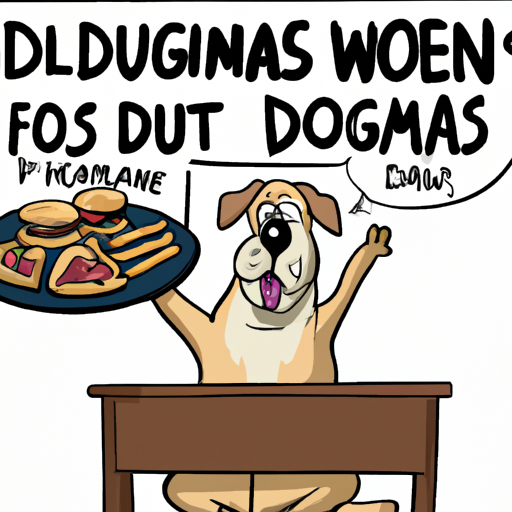If you are a dog owner, you’ve likely noticed that your four-legged friend has a keen interest in the food you eat. There’s a particular twinkle in their eye when you sit down for dinner, and a certain drool that only seems to appear when you’re enjoying a succulent steak or a bite of creamy cheese. But why do dogs love human food so much? Let’s delve into the science and psychology behind this canine behavior.
H2: The Science Behind Dogs’ Love for Human Food
Dogs, like humans, are omnivores. They can derive nutrients from a wide variety of sources, and their diet in the wild would naturally consist of a mix of meats, fruits, and vegetables. But the food we feed our dogs often lacks the variety and flavor of human food. Commercial dog food is typically made from byproducts and fillers, and while it is designed to meet a dog’s nutritional needs, it often falls short in the taste department.
- Taste Buds: Dogs have about 1,700 taste buds, compared to our 9,000. But they have a special fondness for meats and fats because they have a lot of taste buds specifically tuned to the flavors of amino acids, the building blocks of proteins.
- Smell: Dogs have an incredibly keen sense of smell that far surpasses ours. They can detect a wealth of information from a single whiff, and this powerful sense of smell makes human food particularly enticing.
- Texture: Dogs also enjoy the different textures that human food provides, which can be a nice break from the monotony of kibble.
H2: The Psychology Behind Dogs’ Love for Human Food
Beyond the physical allure of human food, there’s also a psychological component to dogs’ desire for our meals.
- Positive Association: Dogs associate human food with positive experiences. When you give your dog a bite of your food, it’s often in a context of love, attention, and praise.
- Pack Mentality: In the wild, dogs are pack animals. Eating is a communal activity, and a dog wanting to join in on your meal can be a sign of them seeing you as part of their pack.
- Curiosity: Dogs are naturally curious animals. They are intrigued by the smells, textures, and tastes of new things, and human food is no exception.
H2: The Risks of Feeding Dogs Human Food
While it’s natural for dogs to be interested in human food, it’s important to remember that not all human food is safe for dogs. Some foods, like chocolate, grapes, and onions, can be toxic to dogs. Even foods that are generally safe for dogs can lead to obesity and other health problems if given in excess.
- Toxic Foods for Dogs: Some of the most common toxic foods for dogs include:
- Chocolate
- Grapes and raisins
- Onions and garlic
- Xylitol (a sweetener often found in sugar-free gum and candy)
- Alcohol
- Obesity: Dogs that are fed too much human food can become overweight, which can lead to a host of health problems like diabetes, heart disease, and arthritis.
- Dietary Imbalance: Human food can also lead to nutritional imbalances in dogs. Dogs need a certain ratio of protein, carbohydrates, and fats in their diet, and too much or too little of any one nutrient can lead to health problems.
| Food Type | Safety for Dogs | Potential Health Effects |
|---|---|---|
| Chocolate | Unsafe | Toxicity |
| Grapes | Unsafe | Kidney failure |
| Onions | Unsafe | Anemia |
| Steak | Safe (in moderation) | Obesity, Pancreatitis |
H2: Feeding Dogs Human Food Responsibly
It’s okay to give your dog a taste of your food every now and then, but it’s important to do so responsibly. Here are a few tips to keep in mind:
- Portion Size: Keep portions small. A bite or two of your food is plenty for a dog.
- Toxic Foods: Know which foods are toxic to dogs and avoid them completely.
- Balanced Diet: Make sure your dog is getting a balanced diet. Human food should not replace dog food, but rather be an occasional treat.
- Consult a Vet: If in doubt, consult with your vet. They can provide guidance on what foods are safe and appropriate for your dog.
H2: FAQ
Q: Can dogs eat human food?
A: Yes, dogs can eat some human foods, but it’s important to know which ones are safe. Always avoid foods that are toxic to dogs.
Q: Why do dogs beg for food?
A: Begging is a learned behavior. Dogs beg because they have been rewarded for this behavior in the past.
Q: How much human food can I give my dog?
A: It’s best to keep human food to a minimum. If you do give your dog human food, it should make up no more than 10% of their overall diet.
Q: Can human food make my dog sick?
A: Yes, certain foods can make your dog sick. It’s also possible for a dog to get an upset stomach from eating foods they are not used to.
Q: Can I feed my dog a vegan diet?
A: It’s possible for dogs to live on a vegan diet, but it can be challenging to meet all their nutritional needs. It’s best to consult with a vet before making major changes to your dog’s diet.



